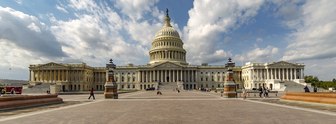Few women politicians apart from Hillary Clinton are known to most of the American public, though most do think that America is ready to elect a woman as President
Even though 2/3 of Americans in the latest Economist/YouGov Poll think the country is ready for a woman president, there is no guarantee that a woman will even be on the ballot in 2016. Although her candidacy is greatly anticipated – or greatly dreaded -- by many, Hillary Clinton has not yet made a decision yet on whether or not to run.
Several media outlets (for example the Wall Street Journal and CBS News) have published stories about those who have doubts about her running. Others have speculated about what could happen if she chose not to run; the Washington Post, for example, predicted "chaos" on the Democratic field. But with so many Americans thinking the country is ready for a woman president, what other women do Americans think could or should run for the highest office in the land?
For the past several weeks, the Economist/YouGov Poll has asked Americans their opinions of other women who could potentially run for president. Last week, when people were asked what women other than Hillary Clinton Americans would want to run for president in either 2016 or 2020, 49 different names were mentioned. However, there were only 8 women named by at least 1% of survey takers, and nearly 2/3 of those in the survey couldn't name a single other woman beyond Clinton.
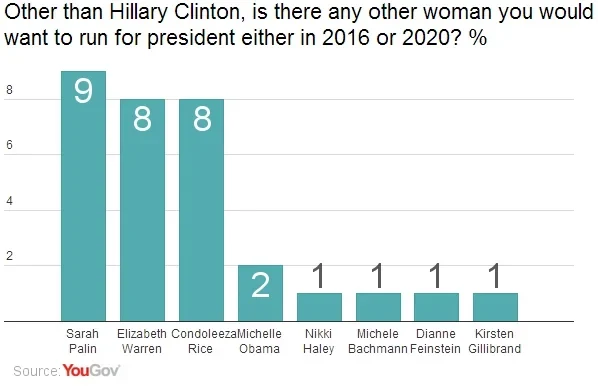
What happened when Americans were asked directly about women currently serving in offices that serve as the traditional spring boards to running for president – Governor and Senator? Since 1932, Americans have elected only two men -- Dwight D. Eisenhower and George H.W. Bush -- who have never served as either. In fact, other than those two men (and Gerald Ford in 1976), both major parties' nominees since 1932 have served as either a Senator or a Governor.
There are currently 5 women Governors and 20 women US Senators, but most Americans don't know who they are. For 21 of the 25 women currently in office, a majority of Americans said they didn't know enough about them to have either a favorable or an unfavorable opinion. Arizona's Governor, Jan Brewer, was the only current serving woman Governor with less than 50% responding don't know. But even though we asked this question right after Brewer vetoed a controversial religious freedom bill that gained national media coverage, still 42% of people didn't know about her. In contrast, only 8% didn’t know enough about former Alaska Governor Sarah Palin.
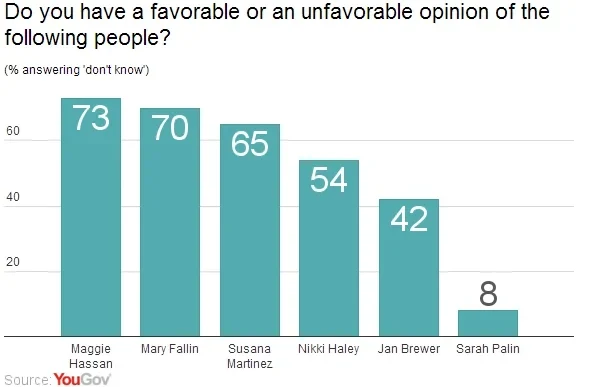
Things aren't better in the US Senate. 22 of the 25 women currently serving in the US Senate face the same name recognition problem. Only Dianne Feinstein and Barbara Boxer, who have both represented California in the Senate for more than 20 years, and Massachusetts' Elizabeth Warren had more than 50% recognition. In contrast, only 7% reported not knowing about Hillary Clinton, the former US Senator from New York.
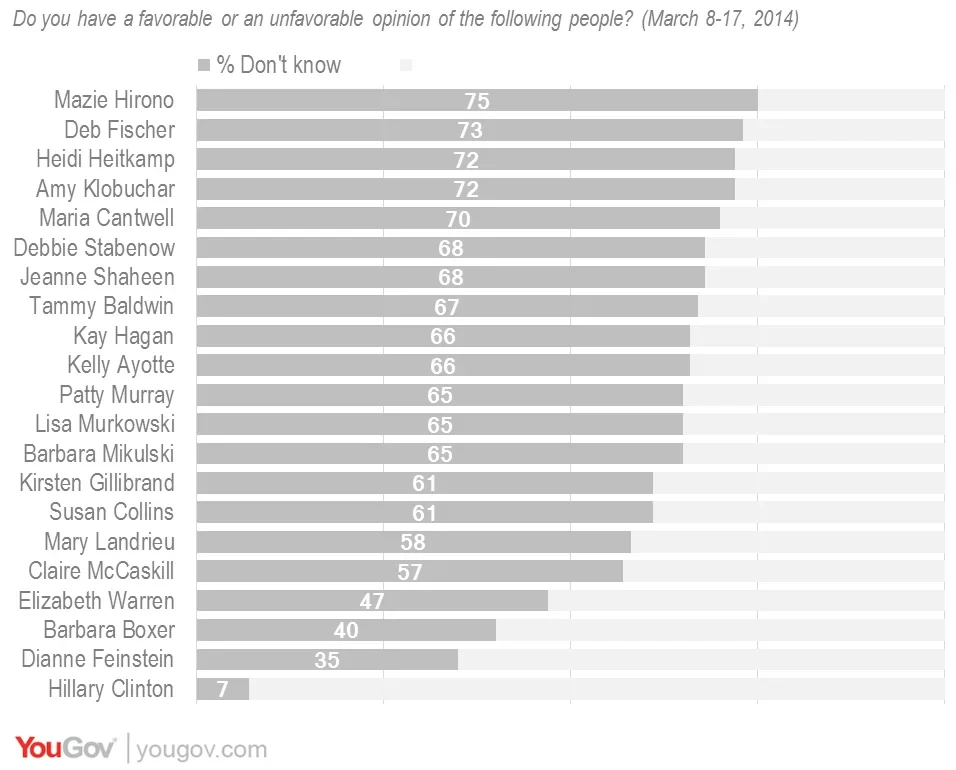
A lot can change in the two years from now until 2016. For example, back in February 2006, a Gallup poll about Democratic presidential contenders for 2008 did not even include Barack Obama, then a freshman US Senator from Illinois.
In addition to these name recognition problems (which every candidate faces), women candidates have additional challenges. For example, surveys dating back almost twenty years show that only for a decade have a majority of Americans thought the country was ready for a woman president. That figure continues to grow.
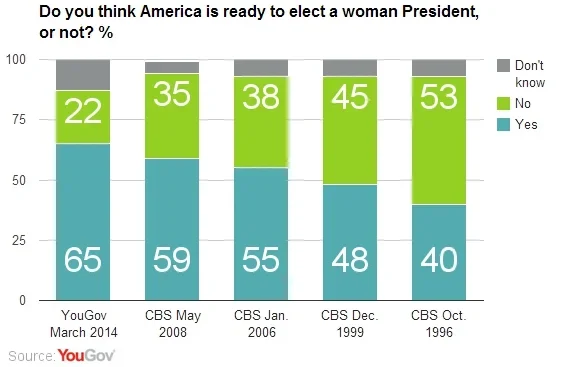
But while 65% of Americans think the country is ready for a woman president, only 54% -- 11 points fewer -- think most people they know would vote for a woman candidate for president. Unlike the previous question, this question has shown both increases and decreases over the past few years.
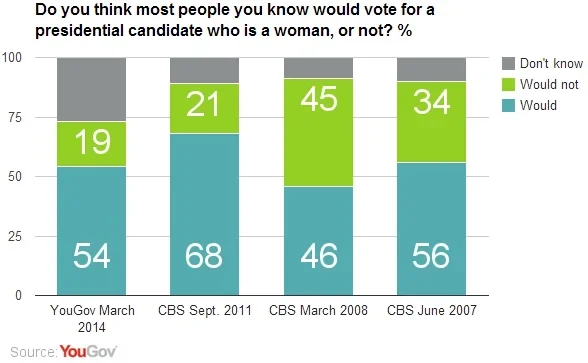
National security concerns and gender stereotypes may have combined to give rise to doubts about women as presidents: with Russia pursuing a very aggressive foreign policy, the threat of Iranians developing nuclear weapons, the use of chemical weapons in Syria, the Arab Spring and its aftermath, and the seemingly incoherent actions of North Korea may have highlighted international concerns today, raising doubts about women leaders. When asked if people had confidence in a woman president's ability to deal with an international crisis, an overall majority of Americans -- and majorities of Democrats and Independents -- expressed having confidence, but a majority of Republicans were either unsure or not confident.
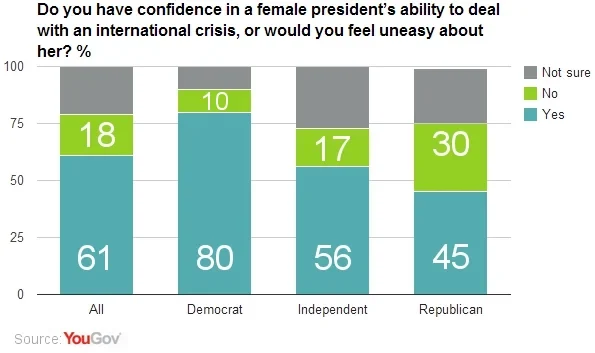
Political Scientist, Michele Swers, found that "gender stereotypes favoring male defense leadership create an additional hurdle for women, particularly Democratic women, as they seek to establish their reputations on security." Is that true? While nearly half reported that men and women were equally tough when it came to national defense, 24% said men were tougher. But when we asked if female politicians have to appear to be tougher on national defense, more Americans disagreed.
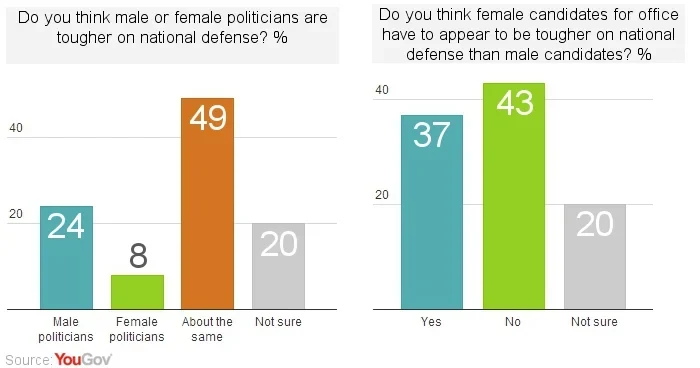
Are there other stereotypes –such as how Americans view displays of emotion -- that affect women candidates but not their male counterparts? Are men and women judged differently? Just last month a Boston Globe writer penned a piece called "Big girls do cry, and that's OK" Americans appear to think that both big boys and big girls show emotion and that's OK. 62% of Americans said it was appropriate for male candidates and female candidates to show their emotions in public.
Image: Getty
Full results can be found here.
Economist/YouGov poll archives can be found here.









